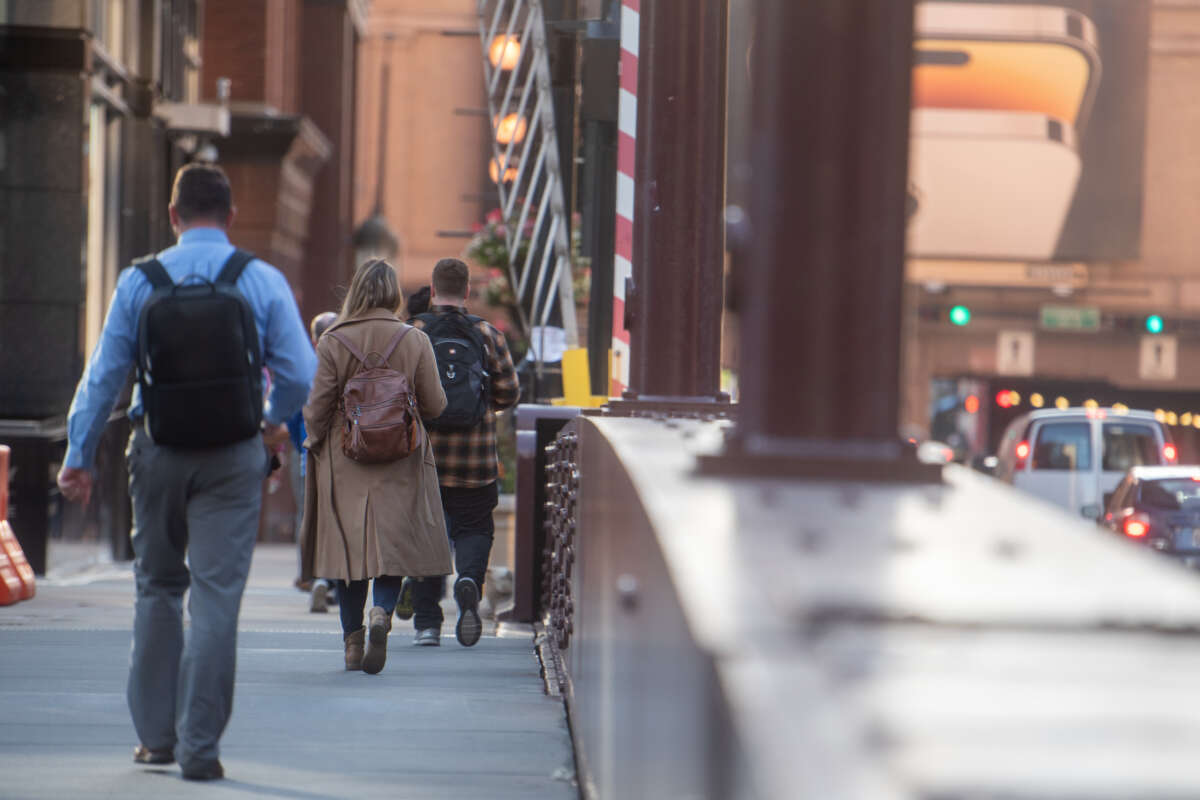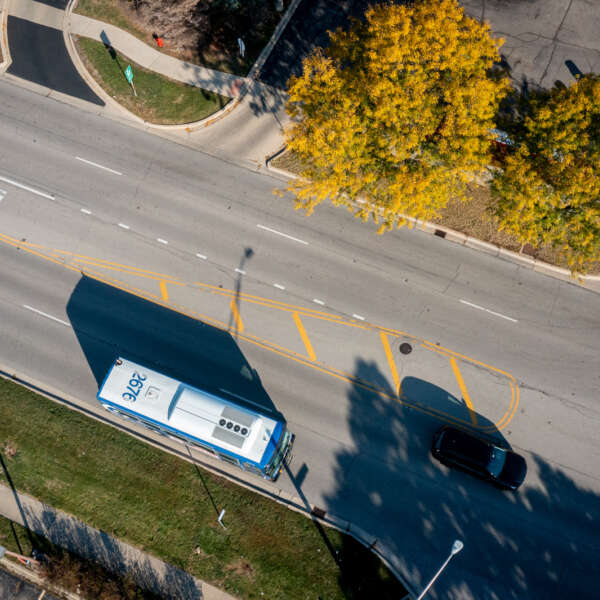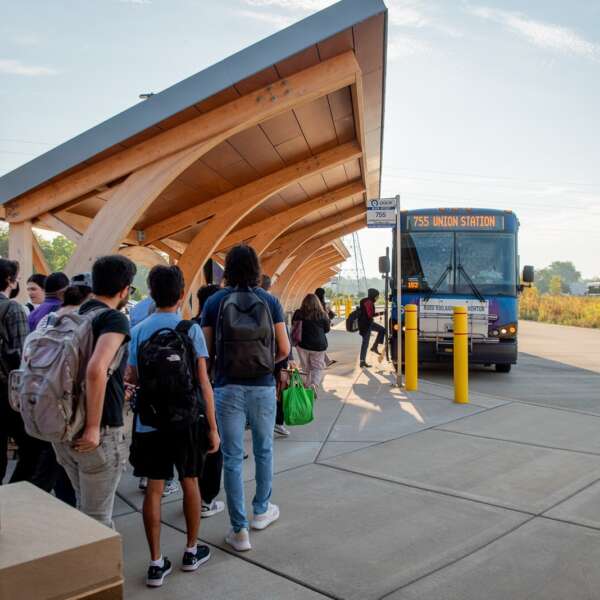Second Transit is the Answer Coalition meeting explores making the system safer and more secure for everyone
August 11, 2023
August 11, 2023

Over 100 riders, elected officials, advocates, and other stakeholders met virtually with the RTA on August 8 for the second quarterly Transit is the Answer Coalition meeting and discussed how to tackle safety and security issues on and around our regional transit system. Attendees heard from RTA staff on the agency’s plans to work with local partners to organize a cross-sector public safety and security summit and participants shared their ideas and feedback on possible new initiatives to help riders and operators feel more secure.
The meeting was convened to gain insight from coalition members on how transit safety and security impacts our communities and decisions on whether to ride transit. RTA’s upcoming safety and security summit will facilitate information sharing, develop holistic solutions to complex challenges, and advocate for funding and implementing new initiatives.
The first part of the meeting was an overview of Transit is the Answer, the RTA’s regional transit strategic plan, and a synopsis of the first coalition meeting held in May, which delved into funding and expanding free and reduced fare programs.
The RTA continued the meeting by reminding attendees that the agency’s role is to lead on addressing regional problems for transit, which includes the commitment to ensure that core riders and operators can safely use the system. This commitment came from a robust engagement process during plan development involving more than 100 working group members, thousands of survey respondents, and interactions at community events in every county in the region.
Peter Kersten, RTA’s Strategic Plan Implementation Program Manager, said momentum continued to build towards a transit safety summit when Mayor Brandon Johnson invited RTA Board Chairman Kirk Dillard to serve as a co-chair on the transportation subcommittee of his transition team. Through that process a diverse group of civic leaders agreed that improving safety on public transit should be a top priority. After the transition report was finalized, RTA met with Mayor Johnson’s community safety team to continue to develop the safety summit concept along with the Chicago Community Trust, who is interested in being a philanthropic partner in the effort.
Next in the coalition meeting, RTA staff shared some examples of approaches to public safety which have proven successful in other regions. We invited attendees to share their experiences on public transportation safety within smaller breakout groups and we encouraged these groups to brainstorm potential strategies Chicago-region transit agencies could consider.
Breakout groups were asked to respond to the prompt, “How does personal safety influence your decision whether to ride public transit?” Attendees discussed a variety of factors that make them feel unsafe or uneasy, including: unpleasant or unsafe conditions on the walk to and from a transit stop, poor connections to transfer between lines and agencies, long wait times for buses or trains, elevators being out of service, inadequate lighting, dirty stations, lack of staff presence on CTA trains, people doing drugs on transit vehicles, mostly-empty vehicles during off-peak hours, being unable to text someone in authority during an emergency on a CTA train, and security guards or police who may not be qualified to work with people with mental illness.
Attendees were then asked to brainstorm what types of partnerships and programs are most important to improving safety for all – especially the most vulnerable transit riders. Many breakout groups discussed the idea of increasing human presence at stations and on transit vehicles through programs like transit ambassadors. Peer cities deploy ambassadors to ride transit and provide customer service; help make social service connections for people experiencing homelessness; and conduct non-violent intervention and de-escalation for people experiencing mental health crises. Groups also discussed activating space in and around stations with visual and performance art. Some attendees talked about integrating an emergency text system with the Ventra app. Attendees said there's also a need to advocate for policy solutions to homelessness like Bring Chicago Home.
More information on the safety and security summit will be shared as planning gets underway. Watch a recording of the full Coalition meeting online, read anonymized notes from breakout group discussions, and join the Transit is the Answer Coalition to be part of the process and stay informed on progress.
Subscribe to our Newsletter
Related Articles
 Coalition members provide feedback on ‘Transforming Transit,’ RTA’s vision for improved service and accountability
Coalition members provide feedback on ‘Transforming Transit,’ RTA’s vision for improved service and accountability
Nearly 200 riders, advocates, and other stakeholders met virtually with the RTA on February 11 for the sixth quarterly Transit is the Answer Coalition meetin...
February 20, 2025 Far South Halsted Corridor Study prepares for future Pace Pulse service
Far South Halsted Corridor Study prepares for future Pace Pulse service
An RTA Community Planning project kicked off in late 2023 as a crucial step in bringing Pace Pulse service to Chicago’s south suburbs. The Far South Halsted ...
February 19, 2025 RTA proposes reforms to prioritize capital projects, maximizing impact of funding
RTA proposes reforms to prioritize capital projects, maximizing impact of funding
RTA is proposing a historic restructuring of the region’s transit governance to maximize the impact of new operating funding and ensure all riders experience...
February 5, 2025 RTA proposes reforms to integrate fares, require accountability for faster and more reliable transit
RTA proposes reforms to integrate fares, require accountability for faster and more reliable transit
RTA is proposing a historic restructuring of the region’s transit governance to maximize the impact of any new operating funding and ensure all riders experi...
February 5, 2025 For the third year in a row, regional transit ridership was up by double-digits in 2024
For the third year in a row, regional transit ridership was up by double-digits in 2024
Ridership across the Chicago region’s transit system continued to increase throughout 2024, according to the latest data from CTA, Metra, and Pace. The regio...
January 28, 2025 RTA is seeking $1.5 billion in annual operating funding. What would that mean for your commute?
RTA is seeking $1.5 billion in annual operating funding. What would that mean for your commute?
On January 15, RTA released Transforming Transit, a vision for the regional transit system with $1.5 billion in annual operating funding supported by a stron...
January 28, 2025